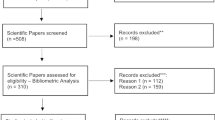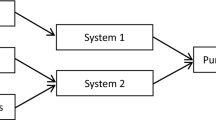Abstract
Discussions about the impacts of marketing systems on society have been strongly encouraged in the field of macromarketing. However, these studies have focused on analyzing human and organizational actors, neglecting, to a large extent, the impacts of practices of marketing systems on other non-human stakeholders, such as those associated with or materialized in the form of a product. This article debates the material basis of the product of animal origin based on the concepts of justice, stakeholder theory, and externalities. An argument was developed attributing the status of a moral agent to the animals used to make products and focusing on this debate, arguing for the establishment of a consumption pattern that morally considers animals. This was made feasible by new alternatives for food performances exemplified by the conduct of vegetarian and vegan consumers.
Similar content being viewed by others
References
Aaltola, Elisa. 2005. Animal ethics and interest conflicts. Ethics & the Environment 10 (1): 19–48.
Allen, Collin, and Mark Bekoff. 2007. M animal minds, cognitive ethology. and ethics. The Journal of Ethics 11: 299–317.
Becvarova, V. 2005. Agribusiness – A scope as well as an opportunity for contemporary agriculture. Agricultural Economics 51 (7): 285–292.
Bermudez, Jose Luis. 2007. Thinking without words: An overview for animal ethics. The Journal of Ethics 11: 319–335.
Beverland, Michael B. 2014. Sustainable eating: Mainstreaming plant-based diets in developed economies. Journal of Macromarketing 34 (3): 369–382.
Broom, D.M. 2010. Animal welfare: An aspect of care, sustainability, and food quality required by the public. Journal of Veterinary Medical Education 37 (1): 83–88.
Burghardt, Gordon M. 2009. Ethics and animal consciousness: How rubber the ethical ruler? Journal of Social Issues 65 (3): 499–521.
Carlsson-kanyama, A., and A.D. González. 2009. Potential contributions of food consumption patterns to climate change. The American Journal of Clinical Nutrition 89 (5): 1704S–1709S.
Craig, W.J. 2010. Nutrition concerns and health effects of vegetarian diets. Nutritional in Clinical Practice 25 (6): 613–620.
Degrazia, D. 2009. Moral vegetarianism from a very broad basis. Journal of Moral Philosophy 26: 143–165.
Dombrowski, D. 2004. A very brief history of philosophical vegetarianism and its influence. In Food for thought: the debate over eating meat, ed. S.F. Sapontzis. New York: Prometheus Books.
Edwards, M.R., and C.J. Shultz II. 2005. Reframing agribusiness: Moving from farm to market centric. Journal of Agribusiness 23 (1): 57–73.
Ferré, Frederick. 2010. Persons in nature: toward an applicable and unified environmental ethics. In Environmental ethics: the big questions, ed. D.R. Keller. United Kingdom: Wiley-Blackwell.
Ferrel, O.C., and Linda Ferrel. 2008. A macromarketing ethics framework: Stakeholder orientation and distributive justice. Journal of Macromarketing 28: 24–32.
Fiddes, Nick. 1994. Social aspects of meat eating. Proceedings of the Nutrition Society 53: 271–280.
Forsé, Michael, and Maxime Parodi. 2009. Distributive justice: An ordering of priorities. A comparative analysis of European opinions. International Review of Sociology 19 (2): 205–225.
Fox, Nick, and Kate Ward. 2008. Health, ethics and environment: A qualitative study of vegetarian motivations. Appetite 50: 422–429.
Harvard Medical School. 2014. Harvard Women’s Health Watch, 21(9).
Haught, Paul. 2010. Hume’s knave and nonanthropocentric virtues. Journal of Agricultural and Environmental Ethics 23 (1–2): 129–143.
Hopkins, Patrick D., and Austin Dacey. 2008. Vegetarian meat: Could technology save animals and satisfy meat eaters? Journal of Agricultural and Environmental Ethics 21 (6): 579–596.
Irvin, Sherri. 2004. Capacities, context and the moral status of animals. Journal of Applied Philosophy 21 (1): 61–76.
Kaiser, M., and A. Algers. 2016. Food ethics: A wide field in need of dialogue. Food Ethics 1 (1).
Keller, David R. 2010. Environmental ethics: The big questions. United Kingdom. Wiley-Blackwell.
Layton, Roger. 2007. Marketing systems - a core macromarketing concept. Journal of Macromarketing 27 (3): 227–242.
Layton, Roger. 2011. Towards a theory of marketing systems. European Journal of Marketing. 45 (1/2): 259–276.
Layton, Roger.A., and Sanford Grossbart. 2006. Macromarketing: Past, present, and possible future. Journal of Macromarketing 26 (2): 193–213.
Lea, Emma J., D. Crawford, and Anthony Worsley. 2006a. Public views of the benefits and barriers to the consumption of plant-based diet. European Journal of Clinical Nutrition 60 (1): 826–837.
Lea, Emma J., D. Crawford, and Anthony Worsley. 2006b. Consumer’ readiness to eat a plant-based diet. European Journal of Clinical Nutrition 60 (3): 342–351.
Lekan, Todd. 2004. Integrating justice and care in animal ethics. Journal of Applied Philosophy 21 (2).
Miele, Mara, and Adrian Evans. 2010. When food become animals: Ruminations on ethic and responsibility in care-full practices of consumption. Ethics, Place and Enviroment 13 (2): 171–190.
Musschenga, Albert W. 2002. Naturalness: Beyond animal well-being. Journal of Agricultural and Environmental Ethics 15 (2): 171–186.
O’neil, John. 2010. The varieties of intrinsic value. In Environmental ethics: the big questions, ed. D.R. Keller. United Kingdom: Wiley-Blackwell.
Paarlberg, Robert. 2010. Food politics: What everyone needs to know. Oxford: Oxford University Press.
Philips, F. 2005. Vegetarian nutrition. British Nutrition Foundation: Nutrition Bulletin 30: 132–167.
Rachels, James. 2004. The basic argument for vegetarianism. In Food for thought: the debate over eating meat, ed. S.F. Sapontziz. New York: Promotheus Books.
Raphaely, Talia, and Dora Marinova. 2014. Flexitarianism; decarbonising through flexible vegetarianism. Renewable Energy 67: 90–96.
Regan, Tom. 2010. Animals as subjects-of-a-life. In Environmental ethics: the big questions, ed. D.R. Keller. United Kingdom: Wiley-Blackwell.
Rollin, Bernard E. 2011. Animal pain: What it is and why it matters? The Journal of Ethics 15 (4): 425–437.
Ruby, Matthew B. 2012. Vegetarianism. A blossoming field of study. Appetite 58 (1): 141–150.
Sapontzis, S.F. 1987. Morals, reason, and animals. Philadelphia: Temple University Press.
Schwartz, Mark S., and Archie B. Carroll. 2007. Integrating and unifying competing and complementary frameworks: The search for a common core in the business and society field. Business & Society.
Singer, Peter. 2002. Ética Prática. São Paulo: Martins Fontes.
Singer, Peter. 2006. In defense of animals: The second wave. Oxford: Blackwell Publishing.
Singer, Peter. 2010. All animals are equal. In Environmental ethics: the big questions, ed. D.R. Keller. United Kingdom: Wiley-Blackwell.
Solbar, Israel. 2011. Pleasing the vegetarian. Prepared foods. August.
Taylor, Paul W. 2010. The ethic of respect of Nature. In Environmental ethics: the big questions, ed. D.R. Keller. United Kingdom: Wiley-Blackwell.
Vargo, Stephen L. 2011. Market systems, stakeholders and value propositions: Toward a service-dominant logic-based theory on the market. European Journal of Marketing 45 (1/2): 217–222.
Vargo, Stephen L., and Robert.F. Lusch. 2004. Evolving to a new dominant logic for marketing. Journal of Marketing 68 (1): 1–17.
Wilkie, William L., and Elisabeth S. Moore. 2006. Macromarketing as a pillar of marketing thought. Journal of Macromarketing 26 (2): 224–232.
Author information
Authors and Affiliations
Corresponding author
Ethics declarations
Conflict of Interest
Author Stephanie Ingrid Souza Barboza declares that she has no conflict of interest.
Additional information
Publisher’s Note
Springer Nature remains neutral with regard tojurisdictional claims in published maps and institutional affiliations.
Rights and permissions
About this article
Cite this article
Barboza, S.I.S. Equilibrium of the Food Marketing System: a Debate of an Ethical Consumption Performance Based on Alternative Hedonism. Food ethics 2, 139–153 (2019). https://doi.org/10.1007/s41055-018-00031-3
Accepted:
Published:
Issue Date:
DOI: https://doi.org/10.1007/s41055-018-00031-3




